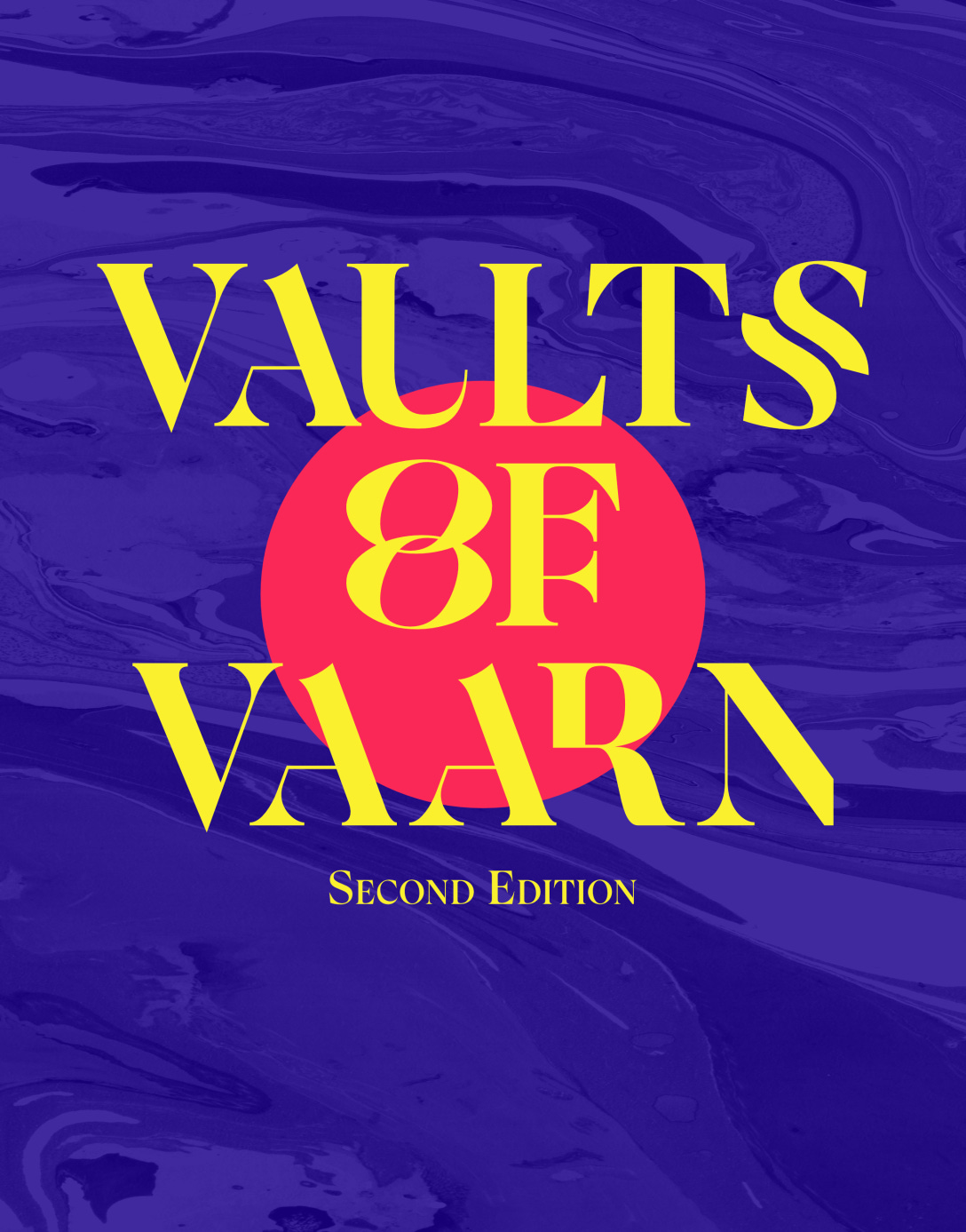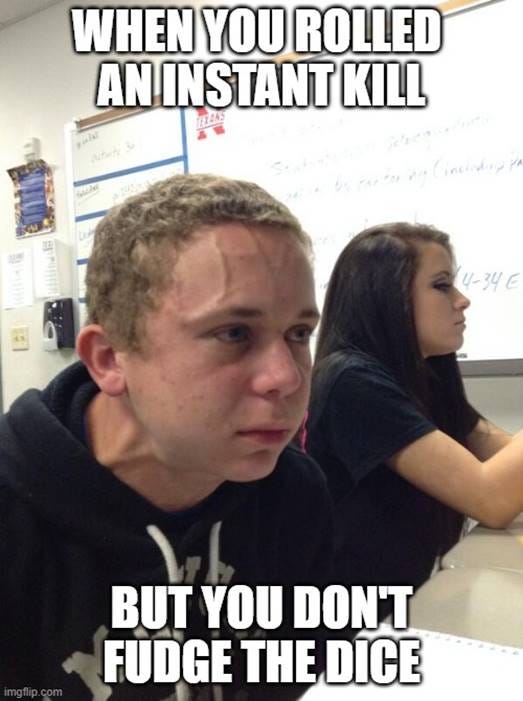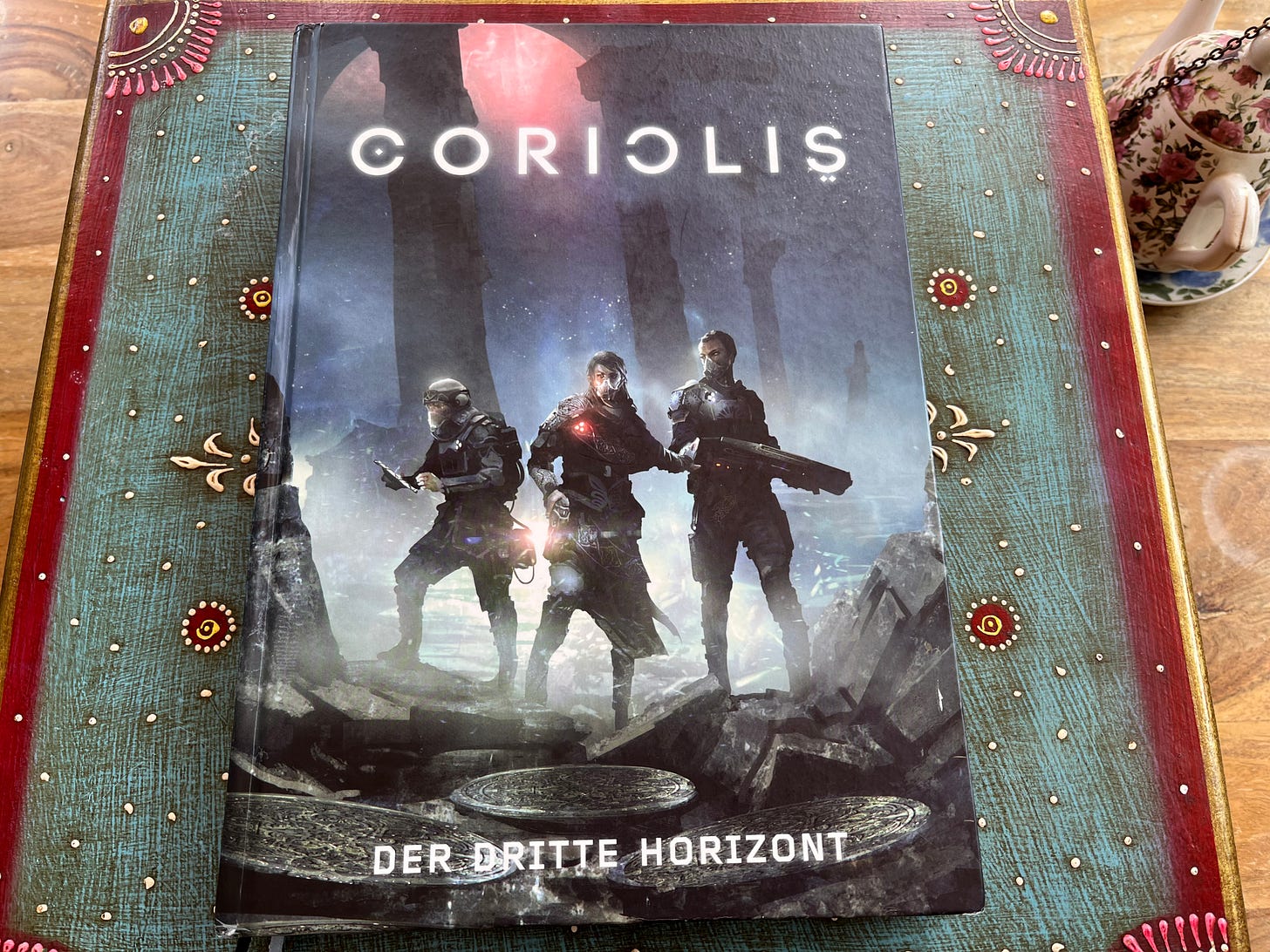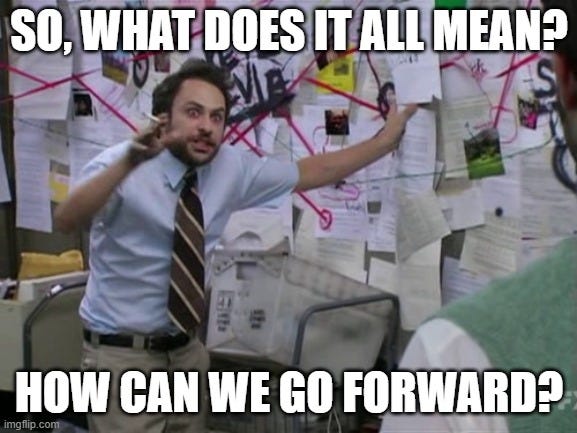The 1-in-1,280 Death
#010 – What I Learned from Killing a PC After 65 Sessions
The odds were 0.078%. Or 1 in 1,280. It wasn't a dramatic boss fight. No showdown. No epic final move. A fight against smugglers that my players had instigated themselves. The battle was almost won, one of the last remaining, already wounded opponents – a nameless NPC – fired a quick, untargeted shot at one of my PCs, actually the leader of the party. A few unfortunate dice rolls later: critical hit, headshot, instant kill. A finely crafted, lifelike character that the player had played for almost 4 years – 65 sessions (!) – in our campaign was dead.
I almost lost my group that day. We just managed to turn things around. But to explain that, I have to start from the beginning.
The dice teetered on the edge
Like so many others, the coronavirus pandemic fueled my passion for role-playing games. During this time, several groups and campaigns emerged that are still going strong today. Among other things, a campaign based on Coriolis – The Third Horizon began in September 2021, which continues to this day with almost the same cast of players.
Coriolis is definitely not OSR, even though this blog is devoted to that genre. While I avoid railroading in the campaign and focus on player agenda, there are significantly more plot elements and worldbuilding on my part as GM than I am used to from my OSR campaigns. I do try to transfer some of the virtues of OSR games that I consider essential to good GMing into this more narrative game. This includes presenting the players with interesting situations they can react to and, of course, rolling the dice openly to allow events to take their course.
What is often praised in OSR as “emergent storytelling” almost cost me my group: In a completely avoidable fight that my players started (albeit with clever ideas and good tactics!), a random hit occurred that, as I already mentioned, killed a PC that the player in question had embodied for 65 sessions or almost 4 years.
I was devastated. All of us were.
Two weeks ago, we played our 65th session of our campaign, when the tragic incident happened. It wasn't an epic send-off, not even a key scene for our campaign. Just an unfortunate roll of the dice. Without going into too much detail, Coriolis is played with a dice pool system (an early, unpolished version of the Year Zero Engine). You roll as many D6 dice as possible and try to roll sixes, which count as successes.
🎯 The Hit That Shouldn't Have Happened
A wounded NPC, desperate and cornered, fired blindly with a penalty. Five dice. Three sixes. A critical hit loomed.
🛡 The Armor That Didn’t Hold
The PC, in cover and with 12 defense dice, needed just two sixes. He rolled none. Not a single one.
☠️ The Critical That Almost Broke The Group
I roll a D66 to determine the type of injury for critical hits. A result of 65 or 66 results in an instant kill, the latter by headshot. What do I roll? A 66 ...!
WHAT WERE THE ODDS!?
Event —- Probability
3 sixes with five dice —- approx. 3.2%
Less than two sixes with 12D6 —- approx. 43.5%
65 or 66 on a D66 —- approx. 5.6%
Ptotal = 0.032 x 0.435 x 0.0556 ≈ 0,00078The odds? 0.078%. One in 1,280. But it happened.
What I learned about the perspective of players and GMs
It was already late, shortly before midnight. The session was ending anyway. There was horror all around. Oh well. But I could already tell that my player wouldn't be knocking on my door the next day with his next PC. It turned out that he was actually on the verge of quitting the game. Not because he was offended or angry, but because he couldn't imagine investing so much in a character again – it had been four years! “His” story was now over.
I hadn't expected that. In Coriolis, we invested an insane amount of time in worldbuilding, even creating our own handouts of the in-game daily news. Everyone involved wrote and read tons of fluff and lore texts to breathe life into the setting. I would have thought that this “living setting” was strong enough to keep the world going.
In the world of OSR, you might think of incredibly elaborate settings like Necrotic Gnome's Dolmenwood, where perfectionists like me can immerse themselves in spinning a complex web of storylines and background events to make the world feel “alive.” I like that, I enjoy it. For me, it’s like creating a work of art. We did something similar in Coriolis. Even if I wanted to, there was no way I could just replace that process and offer a new player the same experience.
At the same time, I couldn't take back the PC's death. It would destroy every bit of immersion, every thrill, indeed the adventure itself, if I simply undid the event or watered it down with a forced ruling. No, we had to go through with it.
However, my argument didn't stand. To my surprise, my player didn't really care how the story continued. While I, as a passionate GM, don't really care which character my players play in our fictional worlds, what mattered to my players was “their story.” He didn't really mind missing out on the painstakingly crafted setting and losing track of all the plot threads I was carefully pursuing in the background while the players weren't engaged with them. Because his story was over …
I realized that despite my focus on player agenda and my absolute rejection of full railroading, I had become so deeply entangled in worldbuilding that I had lost sight of the player's perspective. Of course, they were interested in THEIR personal stories and experiences in the world, not my meta-thoughts about it.
With this lesson in mind, we found a solution with a new character with certain in-game knowledge that provides continuity for the player while introducing many new elements to our campaign. But how will this affect how I run OSR games in the future?
🎭 I will focus even more on the characters’ stories and experiences.
Of course, I’ve always cared about player agency. But this drove it home on a deeper level: what matters most isn’t the elegance of the world or the hidden clockwork behind the scenes—it’s how the players live inside it. It’s how their stories grow, breathe, and sometimes break. I’ll pay closer attention to the narrative arcs that matter to them, even (or especially) if they’re quieter than the ones I’ve mapped out in my notes.
🧭 I will scale back my efforts to weave grand narratives—and instead lean harder into what emerges at the table.
There’s beauty in the sprawling, multi-threaded worldbuilding I love. But I’ll remind myself more often: no one sees the backstage. If it doesn’t emerge through play, it might as well not exist. I’ll let the world respond more directly to the players’ actions, and worry less about long-term narrative structures. Complexity will still be there, but it’ll be something we discover.
🎨 I will ease up on my perfectionism around immersion.
Yes, I’ll still create rich settings. Yes, I’ll still love writing handouts, lore, and in-universe documents. But I’ll remind myself that immersion doesn’t require polish—it requires presence. If a slightly messy moment sparks a powerful memory or emotional beat, it’s more valuable than any perfectly detailed subplot.
🎲 I’ll keep rolling in the open.
Even when it hurts. Especially when it hurts. However, I am also aware that I can interpret results. In Coriolis' case, I didn't necessarily have to buy a critical hit in such an insignificant scene for the attacker's three sixes. I could have come up with a more creative solution, such as damaging the player's weapon. This option is not usually available in OSR, but there are other ideas (see below).
PC Death in OSR
In OSR play, character death is common – expected, even. Many systems are harsh: 0 HP and the game is over. At low levels, death happens frequently, encouraging players to play smart and cautious (which my players did). The lethality, sometimes portrayed in a somewhat exaggerated manner, is often considered a hallmark of OSR games. Narrative depth might only develop as a campaign progresses over a longer period of time, unless it's just a one-shot or a short arc.
The amazing, procedurally generated blue deserts in Vaults of Vaarn by Leo Hunt seem more forgiving (they are not). Instead of killing PCs off at 0 HP, it introduces an innovative system where PCs roll on certain wound tables when reaching 0 or negative HP. Those wounds occupy inventory slots and can permanently decrease attribute values, ensuring that the story goes on in interesting ways. Btw. the game is going to get a greatly enhanced Second Edition this Summer!

But much more has been written on the topic. Here's what I found interesting that some other bloggers had to say on the subject (links in the headlines):
Goblin Punch: “Lethality”
This post highlights how character death can enhance an OSR game’s impact and meaning. It advocates for vivid death scenes, tying consequences into the world, and treating death as part of the story rather than just a mechanic. The threat of death, the author argues, makes players more engaged and invested.
Domain of Many Things: “Deadly, Not Frustrating: Keeping OSR TTRPGs Fun & Fair”
Targeted at players from modern TTRPGs, this article shows how to make OSR lethality feel fair. It emphasizes smart player decisions and warns GMs to clearly telegraph danger to avoid frustration while preserving tension.
Mazirian’s Garden: “Pleasures of the OSR: Overcoming Challenges”
This post explains how OSR-style danger boosts enjoyment. The real reward, it argues, lies in surviving risky choices. GMs are encouraged to let open-ended player actions shape the game’s direction, rather than relying on scripted outcomes.
Fail Forward: “Death & – Moving Towards Lethal-Lite Rules”
A practical look at keeping death meaningful without discouraging players. Suggestions include gear sacrifices to avoid killing blows, legacy mechanics, and “sole survivor” clauses. The goal: keep stakes high, but let players stay connected to the story.
Prismatic Wasteland: “A Better Approach to Deadly Games”
Rather than making death less likely, this post of Prismatic Wasteland argues for making recovery from death easier. Quick character generation, party integration mechanics, and table culture that embraces impermanence are key suggestions. GMs are encouraged to lean into lethality—but make it easy to rejoin the fun.
Axian Spice: “About Dying in Old-School Essentials and Other Old-School Rulesets”
This article outlines optional rules to soften instant death at 0 HP, including “Roll the Body” tables, negative HP ranges, and permanent injuries. The goal is to preserve tension and consequences while giving death more narrative weight. GMs looking to balance harsh rules with character continuity will find valuable tools here.
Personable Thoughts: “Toppling the Pillars of the OSR: Against Lethality”
This contrarian piece calls for less death and more consequence. It argues that reducing fatal outcomes can lead to deeper narratives and character growth. Alternatives like lasting injuries or setbacks keep danger real without constant loss.
Has a random roll ever changed the trajectory of your campaign? How do you handle death in your own OSR (or non-OSR) games?
Tell me what it was and how you responded—mechanically or emotionally.
“From pebble to monolith—your journey matters. The Golems have spoken.”
Alexander from Golem Productions






First of all, sorry for your loss. This can be a tough spot. I can fully relate to your situation, but also your player’s situation. We still haven't figured out what to do with our Coriolis game after the campaign finished and some PCs found their end (even as they did on their own terms). For one player, it was all about that character; and that story is told. He is satisfied and has no interest in seeing the future development of the setting through the eyes of a new character. And that's fair.
There is an important distinction between "player-driven" and "character-driven" campaigns that isn't talked about often enough. They have lots in common, but the greatest difference lies in the fate of a character. Both share a lot of engagement in worldbuilding, but with different motivations. In player-driven sandboxes, the players want to explore the setting; characters can (but don't have to) be expandable. In character-driven sandboxes, the players want to explore their characters. Losing a character, especially not on their terms, is the equivalent of watching the whole world burn down without any influence or agency.
I wish you the best and that your campaign gets back on its feet.
I'll suggest something not found in your linked blog posts. Keep in mind it's just one suggestion, a style of play, that seems absent from your overview, it's not necessarily a specific suggestion for you to implement, but rather just to consider. That suggestion is that you make death more common. To get to the 'why' of that suggestion, let's review a little before progressing.
In the first place, we can categorize games into two categories based on their relationship to death: 1) (the typical mode) is that deaths follow from implementing pre-established rules and processes, and 2) deaths only occur (if they occur at all) with the player's buy in (you could also imagine a 3rd category that deaths occur at GM's whimsy, but I'm going to ignore that possibility for practical reasons).
Given the tone you use to describe your game, and this moment of death, I feel like this particular game is probably better suited for the second mode. But, let's scrap that idea and turn things up to 11!
At least part of the reason (perhaps a large part) of why this death was so painful for your player (and potentially you and your group if he quit playing), is that due to the absence of death, he was not prepared for it. This is where frequent deaths shine. Players must prepare for death, and staying alive becomes an optional (fun) challenge.
Anyways I hope this doesn't come across as too pushy, it's certainly not my goal to criticize your current game, just to offer a different perspective. If you do someday decide to pursue this route, you would be well aided by a confederate player who enjoys taking risks, as this style is something a lot of people don't have their expectations set for, but once you're adapted to it, I think it's great fun.